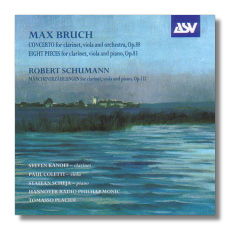
The Internet's Premier Classical Music Source
Related Links
- Latest Reviews
- More Reviews
-
By Composer
-
Collections
DVD & Blu-ray
Books
Concert Reviews
Articles/Interviews
Software
Audio
Search Amazon
Recommended Links
Site News
 CD Review
CD Review
Romantic Clarinet

- Max Bruch:
- Concerto for Clarinet, Viola and Orchestra, Op. 88
- 8 Pieces for Clarinet, Viola and Piano, Op. 83
- Robert Schumann: Marchenerzahlungen, Op. 132 for Clarinet, Viola and piano
Steven Kanoff, clarinet
Paul Coletti, viola
Staffan Scheja, piano
Hannover Radio Philharmonic Orchestra/Tommasso Placidi
Academy Sound & Vision CDDCA1180 68m DDD
Max Bruch will always be remembered for the perennial favourite, his Violin Concerto #1, but during his long career, he massed a large corpus of works, some of which were very popular in his lifetime, particularly his choral music which was widely performed. His major setback was that he absolutely revised to conform to the convulsive changes that were taking place; he even detested Mahler, Richard Strauss and Schoenberg, and by the time of his death, he was discarded as a musician living in dreamland. More recently, a fresh re-appraisal of his works is on the way and rightly so, his music is rich in melody, extremely well crafted and at times, full of surprising and original ideas.
The Double Concerto of 1911 and the Eight Pieces of 2 years earlier were both composed for his son, Max Felix, the only sibling of Bruch's four to become a musician. The Concerto is very concise and very unusual in that each of the 3 movements is faster than the one before with the orchestra growing in size as the work progresses.
For the most part, it is a conversation between the 2 soloists with virtuosity absent altogether. The Eight Pieces are a more substantial work lasting some 35 minutes to the concerto's 18. Each of them is self contained and on Bruch's suggestion they should not be performed altogether in one concert, but rather in combination according to the soloist's choice. Both these works contain some delicious tunes and their charming wistfulness should endear them to listeners coming to them for the first time.
The CD also includes Schumann's four extraordinary pieces of 'Marchener zahlunger'. This poignant and at times, disturbing music was some of the last that Schumann composed before his attempted suicide and eventual incarceration in an asylum where he spent the lat tragic years of his life. In these four pieces the composer allows us to peep into his fantastic world of seamless imagination where children's innocence mingles with terrifying demons. The third movement, in particular, is unique in its exquisite sadness.
Kanoff, Coletti and Scheja give very persuasive renditions and are convincing advocates of this rare but enchanting repertoire. Orchestra and conductor give sympathetic support, allowing the soloists to share and exchange their ideas in total freedom. Well worth investigating.
Copyright © 2005, Gerald Fenech




















